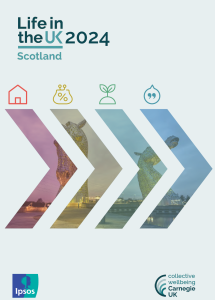- Democracy
- Economy
- Environment
- Evidence and reports
- Inequality
- Measuring wellbeing
- Society
- Hannah Paylor, Carnegie UK
- 5 November 2024
- ISBN: 978-1-7384384-5-7
The Life in the UK index is designed to measure the collective wellbeing of the people of the UK, looking at social, economic, environmental, and democratic aspects of life. This publication outlines Scotland’s scores for collective, social, economic, environmental and democratic wellbeing. The research is based on a representative survey of over 1,100 people from Scotland. It presents key findings in relation to how different demographics are living across Scotland.
Key findings include:
- Wellbeing in stagnation: Our research found no improvement in wellbeing across any of our headline measures for the people of Scotland.
- Deep inequalities: People on lower incomes, disabled people and people under the age of 55 experience the lowest levels of wellbeing.
- Democratic crisis: Trust in government and politics has reached a record low, with over three quarters of people in Scotland feeling they have no influence over decisions that impact the UK. Carnegie UK urges both the London and Edinburgh governments to work on rebuilding public confidence by offering more meaningful public participation opportunities in decision-making.
Our Life in the UK Index shows that we can create a robust and comprehensive measure of social progress, rather than rely on GDP alone. The evidence provides a baseline for policymakers to address the challenges facing Scotland.
We want to see new wellbeing legislation in Scotland that would help the public sector to deliver the cross-governmental, long-term action required to improve quality of life in Scotland. Governments in both London and Edinburgh must focus on measures to tackle democratic alienation and provide greater opportunities for citizens to engage in impactful ways.
Help us make the case for wellbeing policy
Keep in touch with Carnegie UK’s research and activities. Learn more about ways to get involved with our work.
"*" indicates required fields
